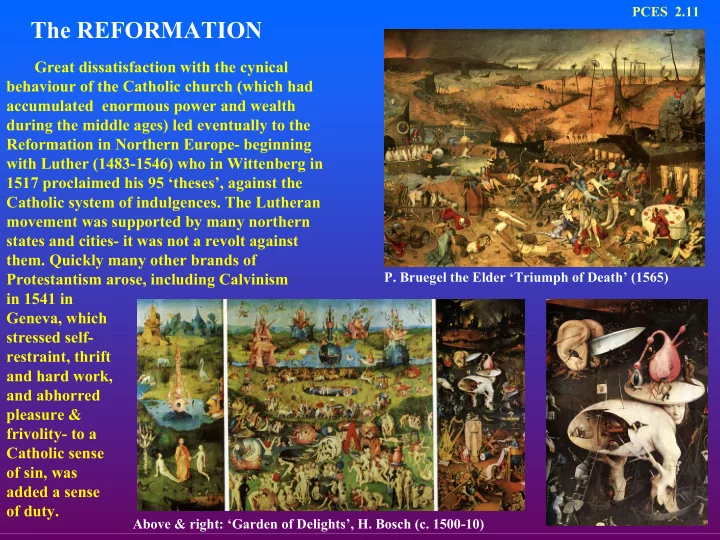

PCES 2.11 The REFORMATION Great dissatisfaction with the cynical behaviour of the Catholic church (which had accumulated enormous power and wealth during the middle ages) led eventually to the Reformation in Northern Europe- beginning with Luther (1483-1546) who in Wittenberg in 1517 proclaimed his 95 ‘theses’, against the Catholic system of indulgences. The Lutheran movement was supported by many northern states and cities- it was not a revolt against them. Quickly many other brands of P. Bruegel the Elder ‘Triumph of Death’ (1565) Protestantism arose, including Calvinism in 1541 in Geneva, which stressed self- restraint, thrift and hard work, and abhorred pleasure & frivolity- to a Catholic sense of sin, was added a sense of duty. Above & right: ‘Garden of Delights’, H. Bosch (c. 1500-10)
PCES 2.12 The COUNTER-REFORMATION & Suite (I) The reaction of Rome to the reformation was not long in coming, in the form of a new ‘Holy Office’ to supervise the Inquisition (along with an Index of banned books- just in time for the invention of the printing press by Gutenberg), the formation of the Jesuits in 1540, and church reform at the 3 councils of Trent. Unfortunately these reforms were reactionary, and the result was violent war across Europe. Catholic strength lay in the Holy Roman & Spanish Empires.
COUNTER-REFORMATION & Suite (II) PCES 2.13 Spain attempted to subdue Britain and the Netherlands, but by the end of the 16 th century had been humiliated- a ‘golden age’ of cultural & economic development then began in both. Civil war raged across Sweden, France (1562-98), Poland, and in the worst fighting, in the 30 yrs war (1618-48) in the Germanic regions. Refugees from war and the Inquisition flocked to places like Amsterdam. During this period it was dangerous to speak too freely. The aftermath was a continent exhausted by war, with a more liberal atmosphere often prevailing in many areas. Intellectual and artistic activity did not cease by any means in southern Europe, but the initiative slowly passed to the north- with the new centre of scientific activity moving to the Netherlands and England.
Recommend
More recommend